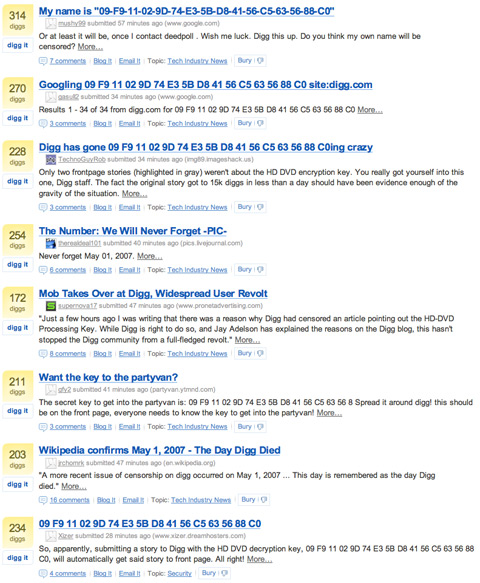
By David Ponce
It’s going on as I write this: users over at Digg are throwing a tantrum of unprecedented proportions and turning against the social bookmarking site they usually revere. They have effectively taken control of the home page and are bringing the servers to their knees, and this turn of events could very well cause some irreparable harm to the previously high-flying website. It’s all over HDDVD, AACS encryption, censorship and alleged bribery. Keep reading for the full story.
A few days ago, a hacker at the Doom9 forums published a string of numbers (a hexadecimal string, to be exact) that represents the master AACS key used in encrypting HD-DVD discs. While this number alone does not give anyone the ability to copy encrypted discs, it can be used to build software that does just that. Understandably, people got excited. Someone posted an initial story on Digg and it hit the front page in minutes… but was then deleted, presumably by Digg administrators. So, someone posted a second story that went on to pick up an unprecedented 15,000 votes before also being deleted. By now, it was clear that Digg was being pressured into censoring any story related to this. Users were being banned, stories deleted and censored… and sure enough some resentful articles started appearing. But things were about to get much worse.
Sometime last night, it surfaced that Digg’s vidcast, DiggNation, is partly sponsored by the HD DVD Promotion Group. Well, dudes and dudettes, at this point, all hell broke loose. Users started submitting thousands upon thousands of stories that featured the AACS string in one way or another, either in the title, or on a picture of a cute kitten, or on a random Blogger account. And all of them started hitting the front page. At once. As you can see from the above picture, nearly every single story is related to this.
So, what does this all mean? Well, Digg’s popularity grew on its democratic aspect. It was founded on the idea that the wisdom of the masses was better able to determine what’s interesting than the autocratic editor. But, like any democracy, it is prone to revolt and the very system that allows it to usually thrive can evidently be turned against itself. Of course this was always a possibility but it wasn’t until it happened that the consequences of a revolt became real. And believe me, there’s a bunch of consequences.
In this case, there’s no putting the cat back in the bag. The AACS encryption key is now public knowledge, and no reasonable effort at censorship will make it go away. How the AACS Licensing Authority will deal with this will be interesting to see, but in my opinion, there’s very little they can do. Someone, somewhere, is working on software that will allow us to copy HDDVDs as I write this. And it will be freely distributed on P2P networks, and that’s that.
But the damage done is likely to run deeper. Digg’s reputation both among its users and among its advertisers is likely to take a hit. Users, feeling treason, are likely to hold back from the site, at least for a while. Advertisers, on the other hand, may fear being associated with a site that has the potential to do things such as this, and this in turn may affect Digg’s ability to run its business. (Of course, I say this with a grain of salt, since websites like YouTube continue to thrive on essentially pirated content.) This is not to mention the very likely lawsuits that are about to hit Digg.
The real consequence however, at least in my mind, is that a bit of innocence has been lost. I know this sounds cliché, but it’s never been more true. The Web 2.0 world is a social world. What has changed on the internet over the last couple of years is the social revolution underway; sites like YouTube, FaceBook, Digg, Reddit, and others are all built around this new paradigm. But until now, the picture has been pretty much rosy. The Digg Mutiny is exposing the darker side of social media, and its disruptive potential; it’s hard not to wonder “What next?”. When users can so easily take control of the home page and break the law (yeah, I know, it’s an unpopular law, and a stupid law and one that I believe will be obsolete eventually. But it’s still a law), you have to wonder just what they can do next, and whether there’s anything that anyone can do about it.
[Update: A few minutes after posting this, I’ve noticed that Digg is offline.]










